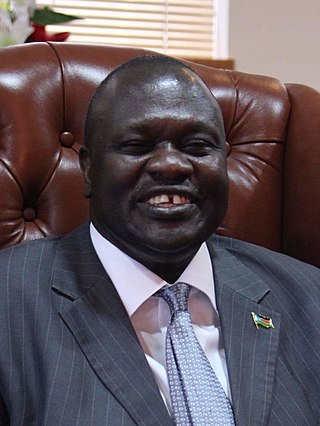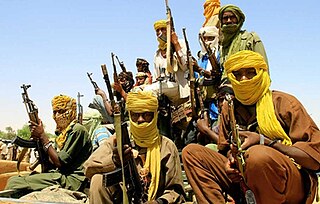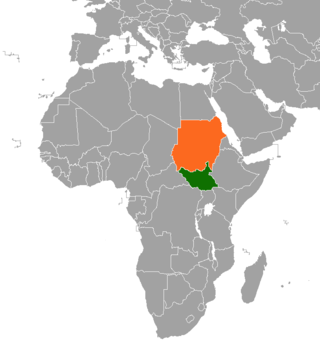| |||||
| Decades: | |||||
|---|---|---|---|---|---|
| See also: | |||||
This article lists events in 2022 in South Sudan .
| |||||
| Decades: | |||||
|---|---|---|---|---|---|
| See also: | |||||
This article lists events in 2022 in South Sudan .
Ongoing – COVID-19 pandemic in South Sudan, South Sudanese Civil War, Sudanese nomadic conflicts, ethnic violence in South Sudan

Salva Kiir Mayardit, commonly known as Salva Kiir, is a South Sudanese politician who has been the President of South Sudan since its independence on 9 July 2011. Prior to independence, he was the President of the Government of Southern Sudan, as well as First Vice President of Sudan, from 2005 to 2011. He was named Commander-in-Chief of the Sudan People's Liberation Army (SPLA) in 2005, following the death of John Garang.

Riek Machar Teny Dhurgon is a South Sudanese politician who has served as the First Vice President of South Sudan since 2020.

The Abyei Area is an area of 10,546 km2 or 4,072 sq mi on the border between South Sudan and Sudan that has been accorded "special administrative status" by the 2004 Protocol on the Resolution of the Abyei Conflict in the Comprehensive Peace Agreement (CPA) that ended the Second Sudanese Civil War. The capital of the Abyei Area is Abyei Town. Under the terms of the Abyei Protocol, the Abyei Area is considered, on an interim basis, to be simultaneously part of both the Republic of South Sudan and Republic of Sudan, effectively a condominium.

The States of South Sudan were created out of the three historic former provinces of Bahr el Ghazal (northwest), Equatoria (southern), and Greater Upper Nile (northeast). The states are further divided into 79 counties.

Gabriel Gatwech Chan, better known by his nom de guerre Tanginye, was a South Sudanese military officer and rebel commander of various ethnic Nuer militant groups during the Second Sudanese Civil War and South Sudanese Civil War.

The Sudanese conflict in South Kordofan and Blue Nile was an armed conflict and insurgency in the Sudanese states of South Kordofan and Blue Nile between the Sudanese Armed Forces (SAF) and the Sudan People's Liberation Movement–North (SPLM-N), a northern affiliate of the Sudan People's Liberation Movement (SPLM) in South Sudan. After some years of relative calm following the 2005 agreement which ended the second Sudanese civil war between the Sudanese government and SPLM rebels, fighting broke out again in the lead-up to South Sudan independence on 9 July 2011, starting in South Kordofan on 5 June and spreading to the neighboring Blue Nile state in September. SPLM-N, splitting from newly independent SPLM, took up arms against the inclusion of the two southern states in Sudan with no popular consultation and against the lack of democratic elections. The conflict is intertwined with the War in Darfur, since in November 2011 SPLM-N established a loose alliance with Darfuri rebels, called Sudan Revolutionary Front (SRF).

Deng Alor Kuol is a South Sudanese politician. He has served as the minister of East African Community Affairs in President Salva Kiir Mayardit's government. He is a member of the Ngok Dinka ethnic group, and was born in Abyei region, an oil-producing border region between Northern and Southern Sudan.

Taban Deng Gai is a South Sudanese politician who has been one of the Vice Presidents of South Sudan in the unity government since February 2020. He served as the First Vice President of South Sudan from 23 July 2016 to February 2020. He was mining minister before being appointed as acting first vice president.
Ethnic violence in South Sudan has a long history among South Sudan's varied ethnic groups. South Sudan has 64 tribes with the largest being the Dinka, who constitute about 35% of the population and predominate in government. The second largest are the Nuers. Conflict is often aggravated among nomadic groups over the issue of cattle and grazing land and is part of the wider Sudanese nomadic conflicts.

The Heglig Crisis was a brief war fought between the countries of Sudan and South Sudan in 2012 over oil-rich regions between South Sudan's Unity and Sudan's South Kordofan states. South Sudan invaded and briefly occupied the small border town of Heglig before being pushed back by the Sudanese army. Small-scale clashes continued until an agreement on borders and natural resources was signed on 26 September, resolving most aspects of the conflict.

The South Sudanese Civil War was a multi-sided civil war in South Sudan fought from 2013 to 2020, between forces of the government and opposition forces. The Civil War caused rampant human rights abuses, including forced displacement, ethnic massacres, and killings of journalists by various parties. Since its end South Sudan has been governed by a coalition formed by leaders of the former warring factions, Salva Kiir Mayardit and Riek Machar. In 2024, the country continues to recover from the war while experiencing ongoing and systemic ethnic violence.
The following lists events that happened during 2011 in Sudan.

Armed clashes took in Wau State from late June 2016 to January 2019 between the Dinka-dominated Sudan People's Liberation Army (SPLA) and local opposition forces, consisting of tribal Fertit militias as well as fighters claiming allegiance to Riek Machar. It is unclear to what extent these rebels were actually part of the SPLM-IO or acting independently while using the SPLM-IO's name. The clashes resulted in the arrest of the state's governor, Elias Waya Nyipuoc, widespread death and destruction in the state capital, Wau town, and the displacement of up to 150,000 people.
The 2014 retreat from Western Bahr el Ghazal, also called the long march north, was an unorganized withdrawal by hundreds of Nuer Sudan People's Liberation Army (SPLA) deserters who sought to flee from Bahr el Ghazal to Sudan during the South Sudanese Civil War. After longstanding tensions between SPLA soldiers belonging to the Dinka and Nuer ethnic groups escalated on 25 April 2014, leading to a massacre of Nuer soldiers at Mapel in Western Bahr el Ghazal, a large number of Nuer SPLA soldiers deserted to escape ethnic prosecution and loyalist SPLA forces. Though some deserters joined SPLM-IO rebels or surrendered to the government, a large number of them marched northward, joined by other SPLA defectors from Northern Bahr el Ghazal. After covering over 400 kilometres (250 mi), this trek eventually arrived in Sudan on 4 August 2014, where they were disarmed.
This article lists events from the year 2019 in South Sudan
This article lists events from the year 2020 in South Sudan
Kuol D. Kuol is a former South Sudan People's Defence Forces (SPLA) general and the chief administrator of the Abyei Area since June 29, 2020.
This article lists events in 2023 in South Sudan.
In January 2022, armed Murle militias attacked Bor Dinka villages in Jonglei State, South Sudan, killing dozens of people.

Between February 2022 and April 2023, clashes broke out in the Abyei area of South Sudan between Twic Dinka militias against Ngok Dinka militias, regarding control of the border between Abyei and South Sudan's Twic County. The conflict ended temporarily following a ceasefire between the Twic Dinka and Ngok Dinka in May 2023. In September 2023, attacks flared up in the border area between Abyei and Twic County between Twic Dinka and Ngok Dinka youth, with several massacres against Ngok Dinka.